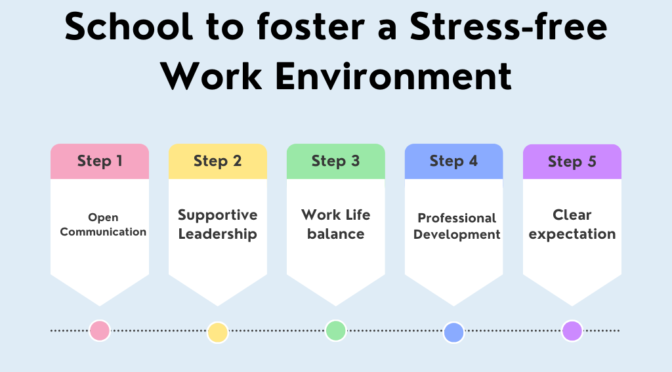Organizational culture refers to the shared values, beliefs, norms, and practices that shape the behavior and interactions of individuals within an organization. In the context of a school, organizational culture encompasses the values and attitudes that define how educators, administrators, and staff members perceive their work, interact with each other, and approach their roles in the educational process. It influences decision-making, communication, and the overall atmosphere within the school.
A positive organizational culture in a school is characterized by collaboration, mutual respect, a shared commitment to educational goals, and a focus on the well-being of both students and staff. It sets the tone for the entire learning environment, impacting the effectiveness of teaching, student outcomes, and the overall satisfaction of the school community.
Organizational Culture in a School to Foster a Stress-free Work Environment:
- Open Communication: Encourage open and honest communication among all members of the school community. Create channels for feedback and dialogue to address concerns and share ideas.
- Supportive Leadership: Leadership plays a pivotal role in shaping the culture. Supportive leaders who prioritize the well-being of staff create a positive environment. They should be approachable, empathetic, and responsive to the needs of the team.
- Work-Life Balance: Emphasize the importance of work-life balance. Establish policies that promote reasonable working hours, discourage excessive workload, and provide flexibility when possible.
- Professional Development: Offer professional development opportunities that focus on stress management, resilience, and strategies for maintaining well-being. Equip staff with tools to cope with the challenges of their roles.
- Recognition and Appreciation: Recognize and appreciate the efforts of teachers and staff. Regularly acknowledge achievements, milestones, and contributions to create a culture of positivity and gratitude.
- Collaborative Environment: Foster a collaborative and team-oriented culture. Encourage teachers to work together, share resources, and support each other in the pursuit of common goals.
- Wellness Programs: Implement wellness programs that address physical and mental well-being. This can include wellness workshops, fitness activities, and access to counseling services.
- Empowerment and Autonomy: Empower teachers by providing autonomy in decision-making and recognizing their expertise. Feeling trusted and empowered can contribute to job satisfaction and reduced stress.
- Conflict Resolution: Establish fair and effective mechanisms for resolving conflicts. A culture that addresses conflicts promptly and constructively contributes to a healthier work environment.
- Student and Teacher Relationships: Promote positive relationships between teachers and students. A supportive student-teacher relationship can contribute to a positive and fulfilling teaching experience.
Also Read : School Organization and Management

Also Visit : Prep with Harshita

